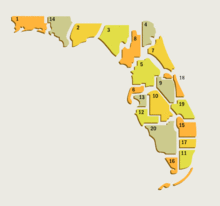Florida circuit courts
The Florida circuit courts are state courts, and are trial courts[1] of original jurisdiction for most controversies. In Florida, the circuit courts are one of four types of courts created by the Florida Constitution (the other three being the Florida Supreme Court, the Florida District Courts of Appeal, and the Florida county courts).[2]
The circuit courts primarily handle civil cases where the amount in controversy is greater than $15,000, and felony criminal cases, as well as appeals from county courts.
Circuits

There are 20 judicial circuits in Florida, all but five of which span multiple counties. They are:[3]
- First Circuit - Escambia, Okaloosa, Santa Rosa and Walton
- Second Circuit - Franklin, Gadsden, Jefferson, Leon, Liberty, and Wakulla
- Third Circuit - Columbia, Dixie, Hamilton, Lafayette, Madison, Suwannee and Taylor
- Fourth Circuit - Clay, Duval and Nassau
- Fifth Circuit - Citrus, Hernando, Lake, Marion and Sumter
- Sixth Circuit - Pasco and Pinellas
- Seventh Circuit - Flagler, Putnam, St. Johns and Volusia,
- Eighth Circuit - Alachua, Baker, Bradford, Gilchrist, Levy, and Union
- Ninth Circuit - Orange and Osceola
- Tenth Circuit - Hardee, Highlands, and Polk
- Eleventh Circuit - Miami-Dade
- Twelfth Circuit - DeSoto, Manatee, and Sarasota
- Thirteenth Circuit - Hillsborough
- Fourteenth Circuit - Bay, Calhoun, Gulf, Holmes, Jackson and Washington
- Fifteenth Circuit - Palm Beach
- Sixteenth Circuit - Monroe
- Seventeenth Circuit - Broward
- Eighteenth Circuit - Brevard and Seminole
- Nineteenth Circuit - Indian River, Martin, Okeechobee and St. Lucie
- Twentieth Circuit - Charlotte, Collier, Glades, Hendry and Lee
Jurisdiction
Florida circuit courts have original jurisdiction not vested in the county courts, direct review of administrative action, and the power to issue writs of mandamus, quo warranto, certiorari, prohibition, and habeas corpus, as well as any other writs necessary to exercise their jurisdiction.[4]
As authorized by the legislature, and in addition to the power to issue various injunctions and other necessary orders,[5] the circuit courts more specifically have the following jurisdiction:
Original jurisdiction
Original jurisdiction is as follows:
- "[A]ll actions at law not cognizable by the county courts . . . ."[6] Therefore, all actions except: most misdemeanor cases, violations of municipal and county ordinances, some disputes occurring in homeowners' associations, and cases where the amount in controversy is equal to or less than $15,000 ("Exclusive of interest, costs, attorneys fees, except those within the exclusive jurisdiction of the circuit courts").[7]
- "[P]roceedings relating to the settlement of the estates of decedents and minors, the granting of letters testamentary, guardianship, involuntary hospitalization, the determination of incompetency, and other jurisdiction usually pertaining to courts of probate . . . ."[8]
- All cases of equity, including those related to juveniles, except for traffic offenses.[9]
- Felonies.[10]
- All cases involving the legality of state tax assessment, toll, or denial of refund.[11]
- Ejectment[12] (But not eviction, which may be brought in county court[13]).
- Title and boundaries of real property.[14]
Appellate jurisdiction
Appellate jurisdiction is as follows:
- Appeals from county courts (except from orders or judgments declaring invalid a state statute or provision of the State Constitution, or any orders or judgments certified by the county court as a matter of great public importance and accepted for review by a District Court of Appeal).[15]
- Appeals from final administrative orders of local government code enforcement boards.[16]
Election
Circuit court judges are elected by the voters of the circuits in nonpartisan, contested elections against other persons who choose to qualify as candidates for the position. Circuit court judges serve for six-year terms, and they are subject to the same disciplinary standards and procedures as Supreme Court Justices and district court judges. [17]
See also
References
- ↑ Fla. Stat. § 26.012(5) (2007).
- ↑ Fla. Const. of 1968, Art. V, § 1 (1998).
- ↑ "General Information". Florida's Circuit Courts. State of Florida. Retrieved 2007-11-26.
- ↑ Fla. Const. of 1968, Art. V, § 5(b) (1972).
- ↑ Fla. Stat. §§ 26.012(3), (4) (2007).
- ↑ Fla. Stat. § 26.012(2)(a) (2007).
- ↑ Fla. Stat. § 34.01(1) (2007).
- ↑ Fla. Stat. § 26.012(2)(b) (2007).
- ↑ Fla. Stat. § 26.012(2)(c) (2007).
- ↑ Fla. Stat. § 26.012(2)(d) (2007).
- ↑ Fla. Stat. § 26.012(2)(e) (2007).
- ↑ Fla. Stat. § 26.012(2)(f) (2007).
- ↑ See Pro-Art Dental Lab, Inc. v. V-Strategic Group, LLC, 986 So. 2d 1244, 1246-49 (Fla. 2008).
- ↑ Fla. Stat. § 26.012(2)(g) (2007).
- ↑ Fla. Stat. § 26.012(1) (2007).
- ↑ Fla. Stat. § 26.012(1) (2007).
- ↑ State of Florida. "General Information". Florida's Circuit Courts. Retrieved 2009-01-13.
